The Library Catalog will be unavailable for planned maintenance Wed., Dec. 20 from 7am to noon. The Libraries’ website, Summon and the OhioLINK catalog will be available during that time.
Tag Archives: Research
Center for Open Science Workshop
Recently UC Libraries and the Graduate School hosted the Center for Open Science for two workshops on research reproducibility. The Center for Open Science, a non-for-profit based in Charlotteville, Va. promotes openess, integrity and transparency in research. Ian Sullivan of the COS facilitied the workshop and worked with researchers to address several types of repoducibility issues in research- Computational, Methodological and Results replicability.
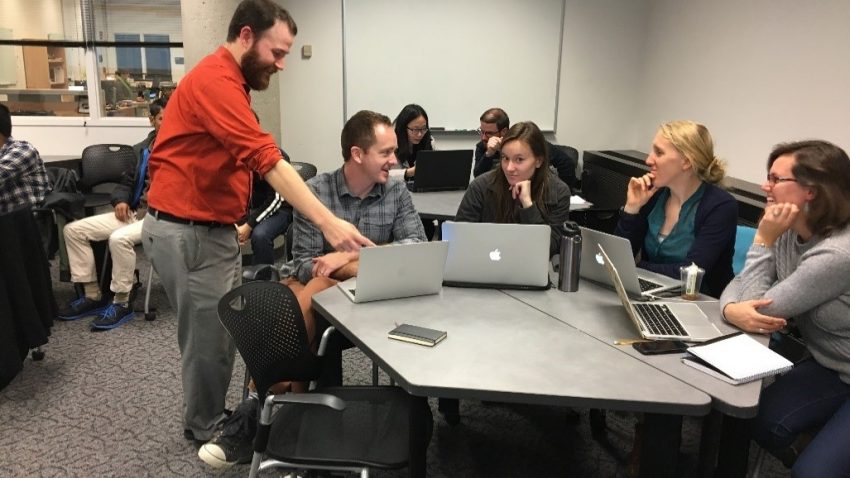
Ian Sullivan of the COS works with UC students and Biology faculty Nate Morehouse at reproducibility workshop
Computational reproducibility means that given the data and code/analysis methods used, someone else could reproduce the graphs and calculations in your paper or report. Methodological reproducibility means that someone else could follow your protocols and rerun the experperiment or research again and get the same results as you did. And results replicability means that with new data and using your methods and analysis, someone else can come to the same conclusion as you did.
What Do Martin Luther, a Hidden Paleontologist and German-Americans Have in Common? They are All in the Latest Source.
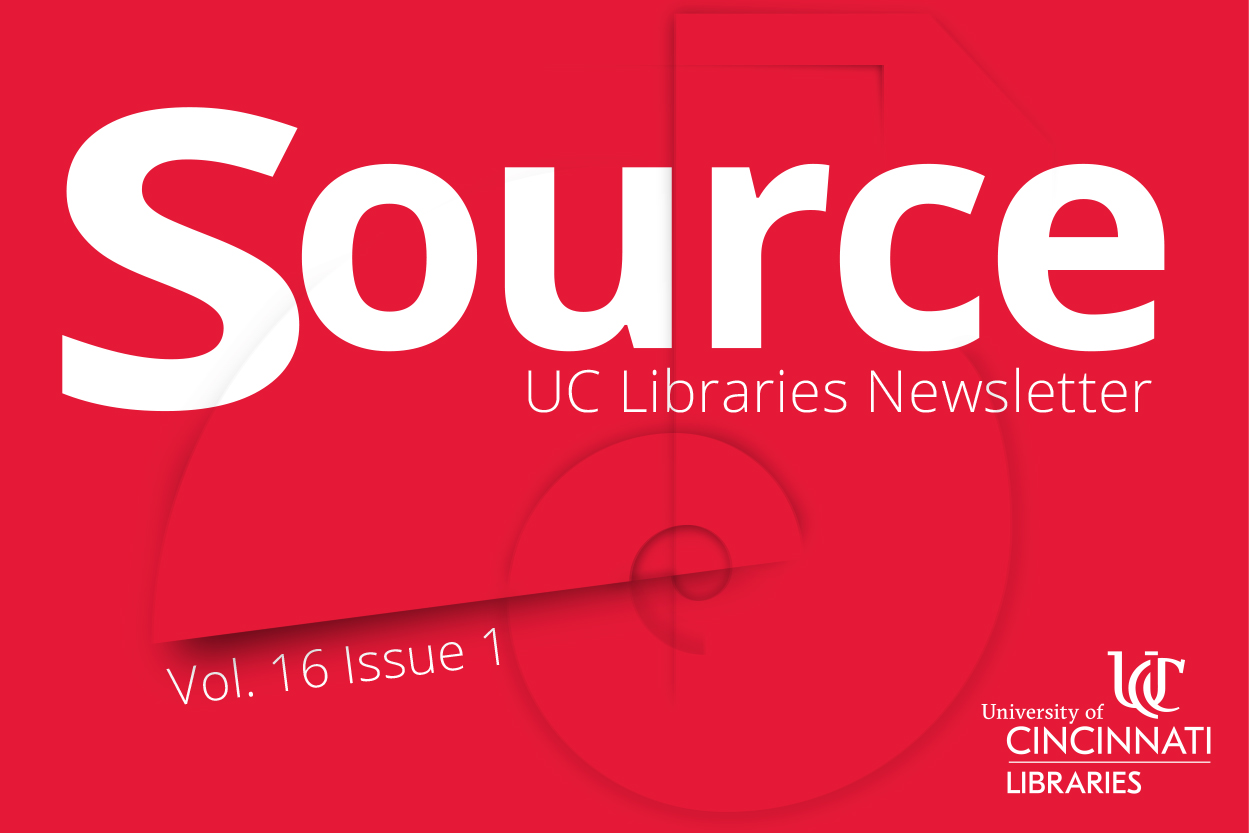 Read Source, the online newsletter, to learn more about the news, events, people and happenings in UC Libraries.
Read Source, the online newsletter, to learn more about the news, events, people and happenings in UC Libraries.
This latest issue of Source includes an article from Xuemao Wang, dean and university librarian, about UC Libraries core beliefs and their role on how we achieve our mission “to empower discovery, stimulate learning and inspire the creation of knowledge by connecting students, faculty, researchers and scholars to dynamic data, information and resources.” Kevin Grace, university archivist and head of the Archives and Rare Books Library, writes about a hidden bust of a famous 20th-century paleontologist and philosopher. Two important gifts are announced in this issues of Source – the first, an endowment from the Marge and Charles J. Schott Foundation for the German-Americana Collection; the second, a legacy gift from Sandra and Robert Cohan to benefit musical collections in the Albino Gorno Memorial Library. Exhibits highlighting the Archives and Rare Books Library’s Shakespeare Collection, the 500th anniversary of the Reformation and a book display for Hispanic Heritage Month are also featured in this issue of Source. In addition, a collaboration between the College of Medicine and the Donald C. Harrison Health Sciences Library to create a grant program to partner medical faculty with library informationists is announced.
Read these articles, as well as past issues, on the web at http://libapps.libraries.uc.edu/source/ and via e-mail. To receive Source via e-mail, contact melissa.norris@uc.edu to be added to the mailing list.
History of the Philomathic Society of Cincinnati College
By Leah Wickett
ARB and Ohio Valley History Intern
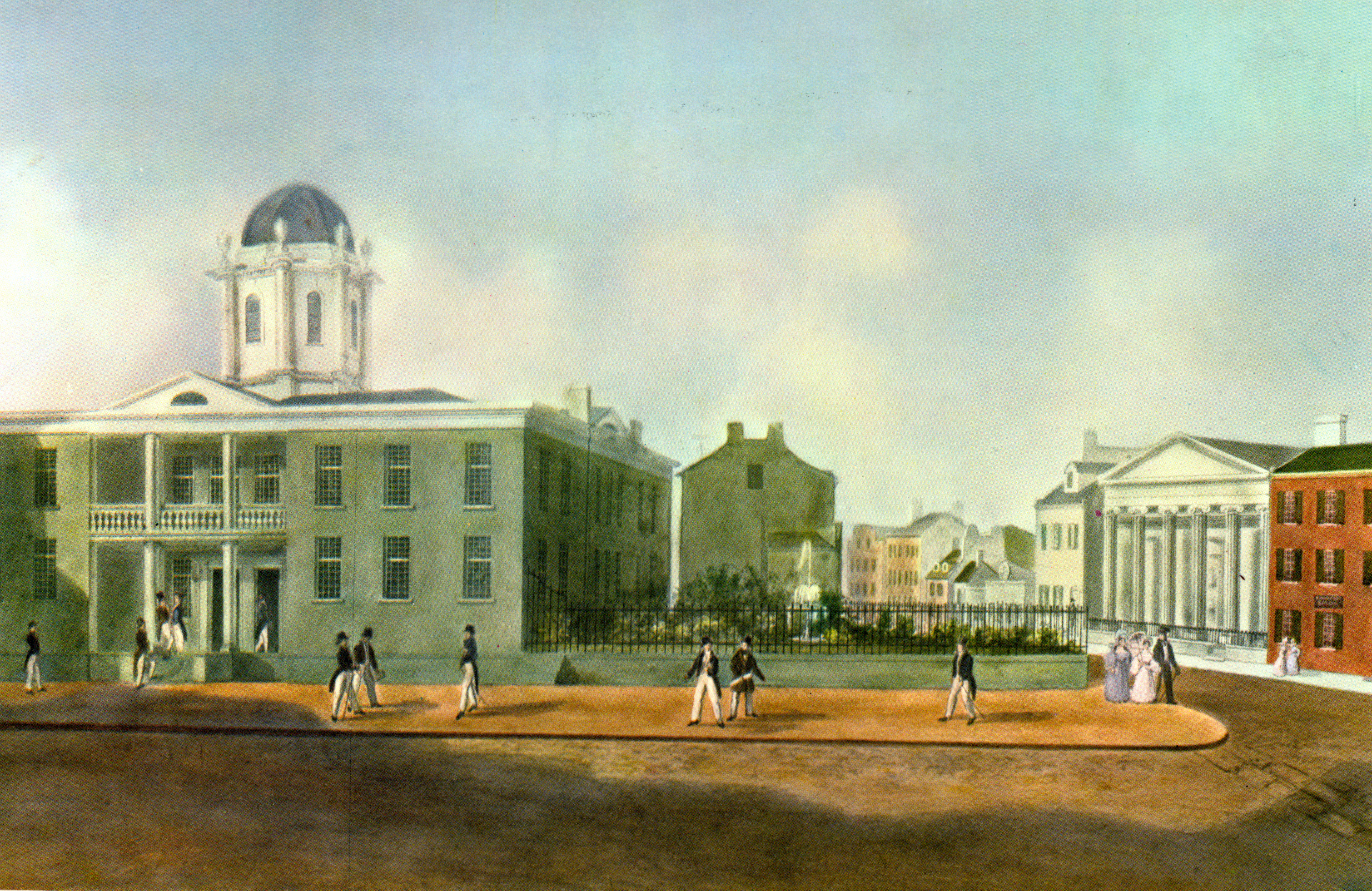
Cincinnati College, 1819
Founded in 1819, Cincinnati College was home to two literary societies, the Philomathic Society and the Erophoebic Society (which had a bit of a rivalry between them).[1] Students of the College formed the Philomathic Society prior to the opening of the College, on January 18, 1818.[2] The Society’s aim was “for mutual literary improvement” and its first members were John Hough James, Junius James, George Mackey Wilson, Lemuel D. Howells, Robert T. Lytle, and Edward L. Drake.[3] Soon after its creation, the student members created a separate branch of the Philomathic Society for elected members consisting of William Henry Harrison, Thomas Peirce, Daniel Drake, Benjamin Drake, Peyton Short Symmes, as well as “other gentlemen, well known at that day… interested in literary affairs.”[4] On April 3, 1821, Daniel Drake invited the members of the Philomathic Society to join the public commencement of the Medical College being held the following day at Cincinnati College’s Chapel.[5] In the early part of 1821, the Society created a semi-monthly paper called The Olio, which featured local literature and was “the first effort on the part of a literary society, in the West, for development of poetic ability.”[6] The publication contained historical essays, articles, poetry, and the occasional “humorous essay.”[7] The Olio, published and edited by John H. Wood and Samuel S. Brooks, ended after just one year of publication.[8] Continue reading
E-books: The Why, the Wow, the How
 We acquired the first e-book for the Clermont College Library collection in August, 2014. Up to that point, we’d purchased only print. And I love print books, holding them in my hand, flipping the pages.
We acquired the first e-book for the Clermont College Library collection in August, 2014. Up to that point, we’d purchased only print. And I love print books, holding them in my hand, flipping the pages.
But as much as I love print books, I appreciate e-books. And here’s why.
Our students can access them from home, in the middle of the night, in their pajamas. They just log-on with off-campus access, search their topic or title and presto…an e-book appears that can be opened and read immediately.
Another reason I like e-books. Our students have access to 1,533,274+ e-books. Can I get a wow?
How do you find an e-book? Go to the library’s web site and in the red box (Summon search box) type in the title or topic you’re looking for. Choose the filters that best suit your search. The results list will indicate if the book is an e-book.
As always, stop by or call the library (732-5233) with any questions.
Penny McGinnis
Technical Services Manager
LexisNexis Academic
Clermont College Library offers many great online databases, including LexisNexis.
LexisNexis is useful for all college students and educators, starting with a simple but powerful search box that allows quick results:
Hot Topics Links will help you to get to current news and topics quickly:
- Search the News, both in the United States and abroad. Comprehensive coverage from international and national publications.
- Look up a Legal Case, from the Supreme Court, Federal Court, and U.S. District Courts including U.S. Bankruptcy and U.S. Tax Courts
- Get Company Information from authorities such as Standard & Poor’s, Hoover’s and SEC filings, and stock reports.
The Advanced Options can help you locate the specific articles or documents you are looking for. The navigation will help you further narrow the results down by date, name, publication title, geographic location and more–until you find what you need.
LexisNexis Help offers online tutorials through its YouTube channel.
Use the Off-Campus access when you are not on a UC Campus.
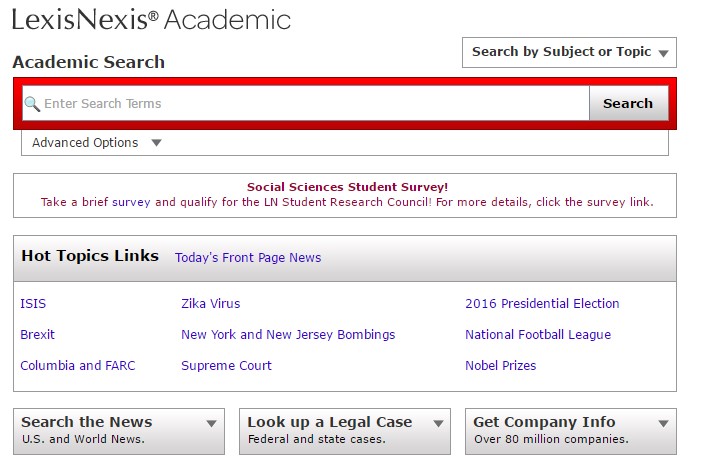
Kathleen Epperson, Librarian
Clermont College Library
Email: Kathleen.epperson@uc.edu
Phone: 513.558.7010
Check out the UCBA Faculty Research Guide!
by Lauren Wahman
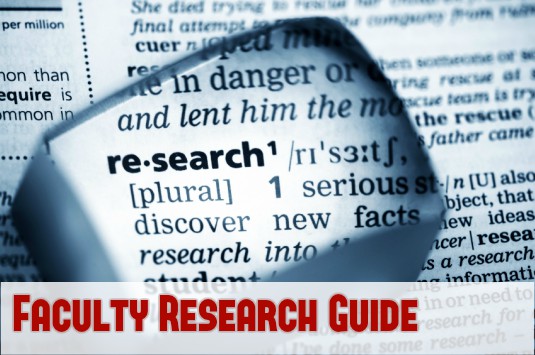 As another fall semester gets underway, the UCBA librarians are ready to help faculty with their research needs. Whether it’s discipline-specific, creative, or a classroom-based (e.g. Scholarship of Teaching & Learning) research project, we’re getting you started with a newly updated Faculty Research Guide (guides.libraries.uc.edu/ucba-facultyresearch). You still find those resources that you know and trust, but you’ll also find new grant and data management resources along with contact information for your go-to experts (including your library faculty liaison). In addition, check out UC’s institutional repository – Scholar@UC – as well as OhioLINK’s Digital Resource Commons. As the semester moves forward, we’ll continue to add more resources.
As another fall semester gets underway, the UCBA librarians are ready to help faculty with their research needs. Whether it’s discipline-specific, creative, or a classroom-based (e.g. Scholarship of Teaching & Learning) research project, we’re getting you started with a newly updated Faculty Research Guide (guides.libraries.uc.edu/ucba-facultyresearch). You still find those resources that you know and trust, but you’ll also find new grant and data management resources along with contact information for your go-to experts (including your library faculty liaison). In addition, check out UC’s institutional repository – Scholar@UC – as well as OhioLINK’s Digital Resource Commons. As the semester moves forward, we’ll continue to add more resources.
Bookmark the guide for quick and easy access: http://guides.libraries.uc.edu/ucba-facultyresearch
UC Libraries Offering Trial of APA Style CENTRAL, Learning Tools for Citation and Formatting Style
The University of Cincinnati Libraries is offering a trial for APA Style CENTRAL, a major new research service produced by the American Psychological Association. APA Style CENTRAL offers a wide range of resources and services for undergraduate and graduate students and faculty in the social sciences and related disciplines. The trial will run from August 1st through August 30th. We welcome you to explore this new APA service, and we encourage you to complete a short (6 question) survey after you have had the opportunity to evaluate this new service.
Big Data Training for Translational Omics Research
Announcing a new summer workshop!
Big Data Training for Translational Omics Research
Purdue University is pleased to announce the first Annual NIH-funded workshop on “Big data training
for translational omics research” in West Lafayette, IN on July 11 – 22, 2016. The two-week workshop will focus on providing biomedical researchers inexperienced in biomedical big data science with entry level training in big data science. The format of the workshop includes a series of problem-based activities to build familiarity and basic competency with established tools and publically available resources. These activities will be complemented by formal lectures on various topics important for big data science. The course is open to faculty, post-doctoral researchers, and graduate students.
The costs of tuition, room, and board are covered for accepted applicants!
For additional information and the online application please visit:
http://www.stat.purdue.edu/bigtap/index.html
Application reviews will begin on April 11, 2016.
Please distribute this e-mail and the attached flyer to anyone you think might benefit from attending.
Dean Xuemao Wang to Join Steering Committee of SPARC
The global coalition advocates Open Access, Open Education and Open Data.
Xuemao Wang, dean and university librarian, has been selected to serve on the Steering Committee of the Scholarly Publishing and Academic Resources Coalition (SPARC).
SPARC is a global coalition of 200+ academic and research libraries that works to enable open sharing of research output and educational materials in order to “democratize access to knowledge, accelerate discovery and increase the return on investment in research and education.” To achieve this mission, SPARC collaborates with authors, publishers, libraries, students, policymakers and the public to build opportunities and promote changes to make open access the default for research and education. Continue reading


